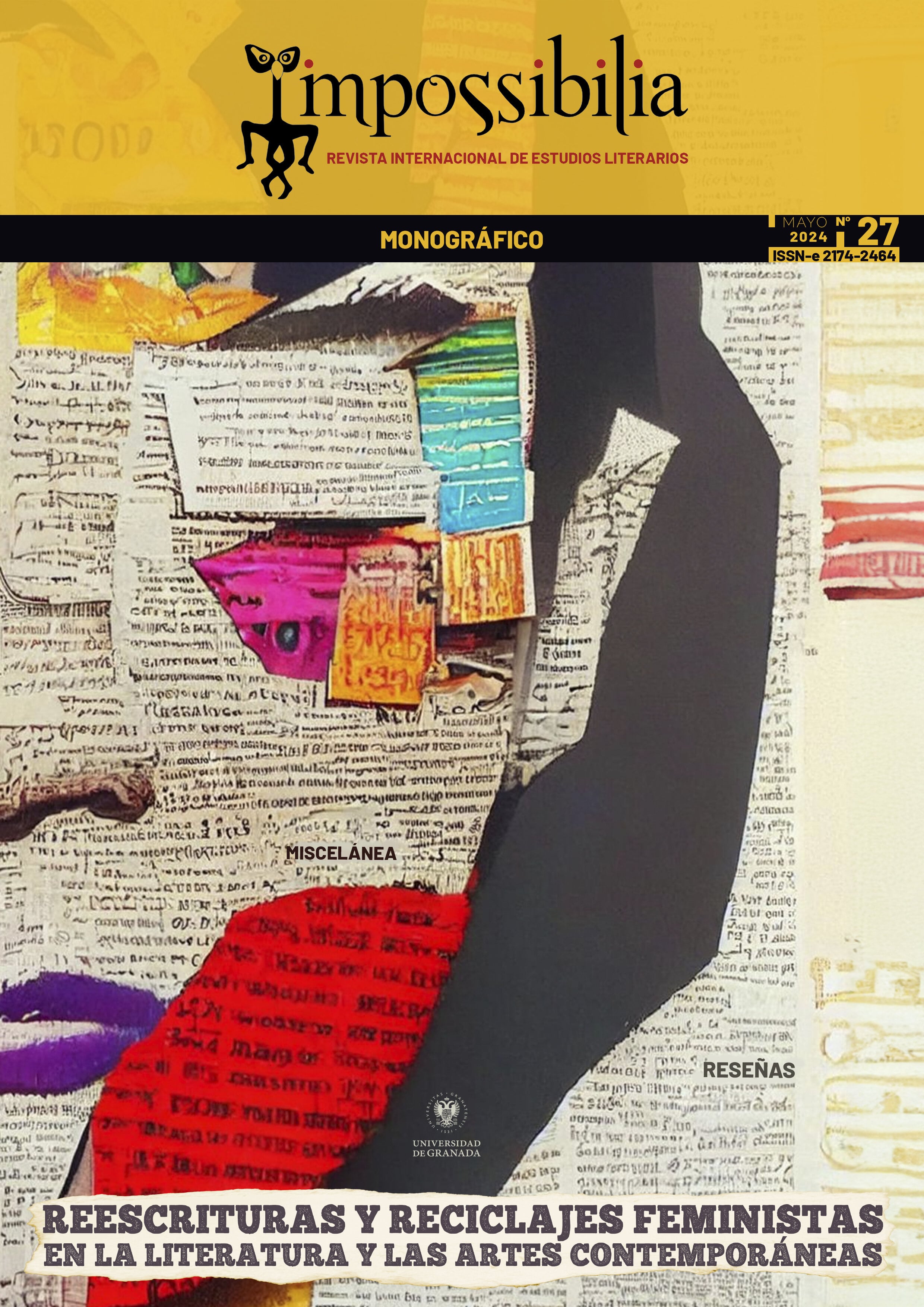Victim, Seductress, or Executioner? The Ambiguously Feminist Recycling of Little Red Riding Hood: From Charles Perrault to Contemporary Pop Culture
DOI:
https://doi.org/10.30827/impossibilia.272024.29866Keywords:
Little Red Riding Hood, Feminism, Recycling Strategies, Empowerment, Narratives, FictionAbstract
Little Red Riding Hood is arguably one of the most famous fairy tales in the world. The tale has traditionally been interpreted as a Freudian learning experience (Bettelheim, 1976), and this popular character as well as its narrative simplicity allowed the renowned scholar Umberto Eco to use it as a parable on the limits of interpretation (Eco, 1994). This article will examine the recycling process that the tale has undergone from Charles Perrault to the present day, spanning various mediums such as comics, movies, anime, or songs from the late 20th to early 21st centuries. The strategies employed to retell and recycle the tale, especially in pop culture (whether from a structural standpoint or under a new conceptual framework), will be studied, along with their implications from the perspective of feminist empowerment.
Downloads
References
BACCHILEGA, Cristina (1997). Postmodern Fairy Tales: Gender and Narrative Strategies. Philadelphia: University of Pennsylvania Press.
BEAUMONT-THOMAS, Ben (2021). Lady Gaga says rape as teenager left her pregnant and caused ‘psychotic break’. The Guardian, 21 may 2021. Available online: https://www.theguardian.com/music/2021/may/21/lady-gaga-rape-teenager-left-her-pregnant-and-caused-psychotic-break
BETTELHEIM, Bruno (1991 [1976]). The Uses of Enchantment: The Meaning and Importance of Fairy Tales. London: Penguin.
BROWNMILLER, Susan (1975). Against Our Will: Men, Women and Rape. New York: Simon and Schuster.
CARTER, Angela (1979). The bloody chamber. London: Gollancz.
DAHL, Roald (1982). Revolting rhymes. London: Jonathan Cape.
DELARUE, Paul & TENEZE, Marie Louise (1976). Le conte populaire français. Paris : Maisonneuve et Larose.
DERRIDA, Jacques (1972). Marges de la philosophie. Paris : Minuit.
DOUGHTY, Amie A. (2006). Folktales Retold: A Critical Overview of Stories Updated for Children. Jefferson, North Carolina: McFarland & Company.
DUNDES, Alan (ed.) (1989). Little Red Riding Hood: A Casebook. Madison: The University of Wisconsin Press.
DWORKIN, Andrea (1974). Woman Hating. New York: E.P. Dutton.
ECO, Umberto (1994). Six walks in the fictional woods. Cambridge: Harvard University Press.
FROMM, Erich (1976 [1951]). The Forgotten Language: An Introduction to the Understanding of Dreams. New York: Fairy Tales, and Myths, Henry Holt & Co.
GAIMAN, Neil (writer) et alii (1989-1996). The Sandman. New York: DC Comics.
GAIMAN, Neil (writer); & VESS, Charles (illustrator) (2010). Instructions. Glasgow: HarperCollins.
GARCÍA-CARCEDO, Pilar (2022). Cenicienta cumple cuatro mil años. Estudio comparativo de los cuentos maravillosos: Princesas activas en las versiones tradicionales. Madrid: Verbum.
GARDNER, Martin (2000). Little Red Riding Hood. Skeptical Inquirer, Notes of a Fringe Watcher, 24(5), 14-16.
GRAY, Richard (2012). The Performance Identities of Lady Gaga: Critical Essays. North Caroline: McFarland & Company.
HAASE, Donald (ed.) (2004). Fairy Tales and Feminism: New Approaches. Michigan, Detroit: Wayne State University Press.
HAYTON, Natalie (2013). Little Red Riding Hood’ in the 21st Century: adaptation, archetypes, and the appropriation of a fairy tale. Doctoral Thesis. Leicester: Montfort University.
JENKINS, Henry (2013). Spreadable media: Creating Value and Meaning in a Networked Culture. New York: NYU Press.
KARR, Jean-Baptiste Alphonse (1849). Les guêpes, january issue.
LIEBERMAN, Marcia. R. (1972). “Some Day My Prince Will Come”: Female Acculturation through the Fairy Tale. College English, 34(3), 383–395.
LURIE, Alison (1970). Fairy Tale Liberation. The New York Review, December 17, 1970 issue.
LYOTARD, Jean-François (1979). La condition postmoderne. Paris: Minuit.
McLUHAN, Marshall (1964). Understanding media: the Extensions of Man. New York: McGraw Hill.
NAPIER, Susan (2005). Anime from Akira to Howl's Moving Castle: Experiencing Japanese Animation. New York: Palgrave Macmillan.
NAPIER, Susan (2006). “'Excuse Me, Who Are You?”: Performance, the Gaze, and the Female in the Works of Kon Satoshi". In BROWN, Steven T (ed.). Cinema Anime: Critical Engagements with Japanese Animation (23-42). New York: Palgrave Macmillan.
ORENSTEIN, Catherine (2002). Little Red Riding Hood Uncloaked. New York: A Member of the Perseus Book Group.
OSHII, Mamoru (1988-2000). Kerberos Panzer Cops. Tokio: Kasakura Shuppansha.
PERRAULT, Charles (2019 [1697]). Contes de ma mère l’Oye. Paris : L’école des loisirs.
PROPP, Vladimir (1969) [1928]. Morphology of the Folktale. Austin: University of Texas Press.
REYNOLDS, Simon (2011). Retromania. New York: Farrar, Straus and Giroux.
ROWE, Karen E. (1979). Feminism and Fairy Tales. Women’s Studies, 6(3), 237-257.
SCHOLES, Robert (1979). Fabulation and metafiction. Chicago: University of Illinois Press.
TEHRANI, Jamshi J. (2013). The Phylogeny of Little Red Riding Hood. PLoS ONE, 8(11), e78871. https://doi.org/10.1371/journal.pone.0078871
TOSCA, Susana (2013). Fairy tale trans-migrations: the case of Little Red Riding Hood. Intersemiose, 4(II). Available online: http://www.neliufpe.com.br/wp-content/uploads/2014/02/11.pdf
ZIPES, Jack (ed.) (1993). The Trials and Tribulations of Little Red Riding Hood. New York: Routledge.
Filmography
Casablanca (dir. Michael Curtiz), 1942.
Illang: the Wolf Brigade (dir. Kim Ji-woon), 2018.
The company of wolves (dir. Neil Jordan), 1984.
Freeway (dir. Matthew Bright), 1996.
Hard Candy (dir. David Slade), 2005.
Hoodwinked! (dir. Cory Edwards), 2005.
Jin-Roh: The Wolf Brigade (dir. Hiroyuki Okiura), 1999.
Rashomon (dir. Akira Kurosawa), 1950.
Red Hot Riding Hood, (dir. Tex Avery), 1943.
Red Riding Hood (dir. Catherine Hardwicke), 2011.
The Red Spectacles (dir. Mamuro Oshii), 1987.
The Sandman (Netflix), 2022.
StrayDog: Kerberos Panzer Cops (dir. Mamuro Oshii), 1991.
The usual suspects (dir. Brian Singer), 1995.
Songs
“LI'L RED RIDING HOOD”, IN LI'L RED RIDING HOOD (SAM THE SHAM & THE PHARAOHS, 1966).
“Monster” in The Fame Monster (Lady Gaga, 2009).
Downloads
Published
How to Cite
Issue
Section
License
Copyright (c) 2024 Impossibilia. Revista Internacional de Estudios Literarios

This work is licensed under a Creative Commons Attribution-NonCommercial-NoDerivatives 4.0 International License.

















